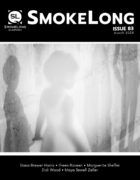What drew you to the Icelandic myth of the tilberi? How did you first learn about them?
One of the things I love about writing is the interplay between mystery and intentionality, both in generation and revision. Maybe I was drawn to tilberi because they can only be created by womxn (witches), and part of their creation relies on redirecting holy rituals (church wine/sacrament) and repurposing bones, or in other words, disrupting what often feel like masculine and patriarchal traditions. Also, I’m always fascinated by milk myths, as well as the roles hooved animals play in storytelling. I don’t remember where I first learned of tilberi, but it was probably my friend Kate (Nuernberger), who a few years back wrote a fabulous book of essays called The Witch of Eye, which everyone should read.
“Recipe” is a two-sentence story and a breathless paragraph. Why did you choose these forms?
I wrote “Recipe” during a frantic month-long collaboration with the artist, poet, and designer Angelo Maneage, who was making visuals. We had been exchanging work to prepare for an AWP conference panel on ekphrasis, and he pulled the image of tilberi from a poem I had written, hooking one through the eye of a horse in a collage whose medium he calls “public domain vandalism.” That’s a lot like what tilberi are doing—so I was really happy to further the monster. In response to his collage, I wrote a two-thousand-word short called “Milk Island,” then figured it needed some origin story for its characters, so I made this “recipe” to explain how to make a tilberi. Some of the recipe follows the Icelandic myth, and some is a bit more of an American bastardization. I like how when someone is casting a spell, they ramp up as they go, adding ingredients, the rhythm of accretion in their tone and breathless chant. I wanted the anger and vengeance to come through rhetorically as the story grows, like a tilberi being created, gathering strength to go out and wreak its havoc. (And the tilberi are a tiny little ars poetica, a hybrid story with two beginnings, like a recipe in two sentences.)
I love the humor in this firecracker flash! How did you find or hone the voice?
Thanks, Chelsea! When I’m angry, especially when I’m angry and hurt, my tone always turns a bit dragon, a bit scorpion tail. I’m currently very angry at America, our complicity, our violence. I’m angry at having been wronged by systems that weren’t designed with all of us in mind. I’m angry at men who won’t take responsibility for their actions, and who want to control women’s bodies and minds and agencies. I’m angry at women who willingly take part. I don’t know if I honed the voice or if America and patriarchy and hypocrisy honed it for me, but I do love a good humor hex when I’m furious. And I’m always a little bit furious.
What is it about American culture that makes it so ripe for the satirical approach?
Maybe I sort of offered this in the last answer, but America in late-stage capitalism, approaching another doomed election, under the collective suffocation of ongoing Covid and too-obvious effects of climate change and social oppression, is full of people who nevertheless “want their sunset,” want their money, want want want. This is a spell against those people, their irresponsible use of the rest of us. The story says it better, but some people will suck and suck at you if you let them. America cheers them on, and religion forgives them.
A recipe is a kind of ritual. What’s an important part of your writing ritual?
Play, imagination, and (I hope!) invitation are at the center of my ritual. This piece is angry, but I had a lot of fun writing it, and the pieces I wrote before and after it, too, in the same sequence. It started on Milk Island, where I like to think I live a lot of the time with other mammals who’ve been milked and milked for years, mammals who are tired but still running around trying. My writing ritual here and in other places involves sonic play and image play, reading and feeding itself through the magical gift of language. I hope there is power in that for the reader, too. I want my rituals to make space for others to pursue their own.


